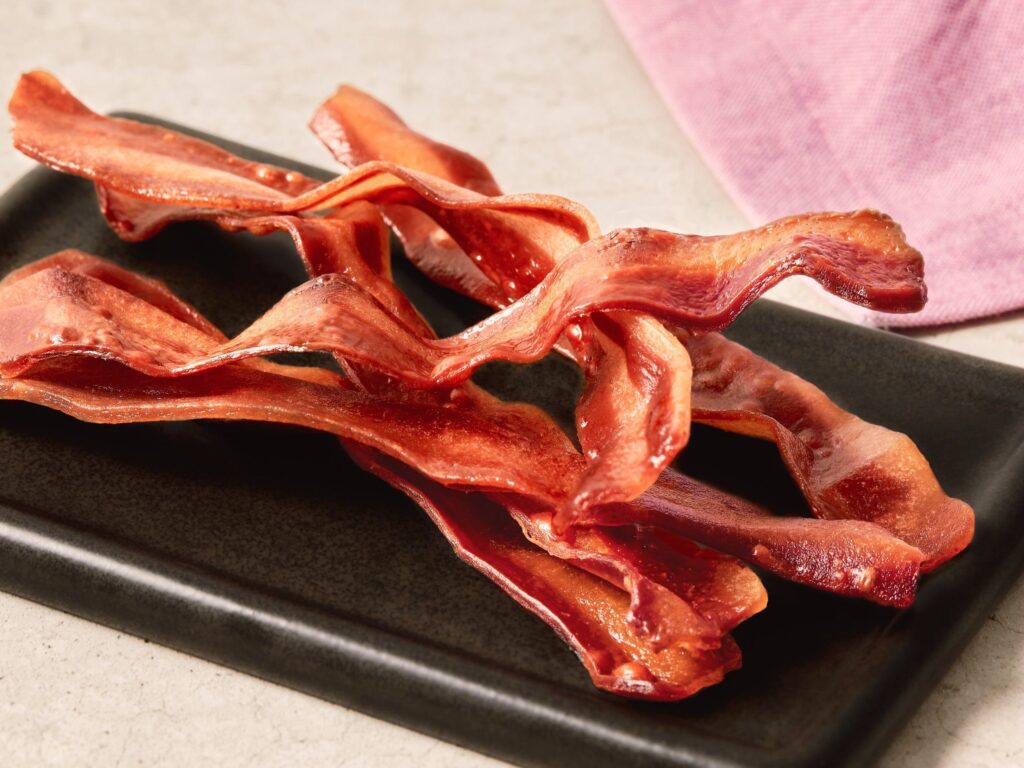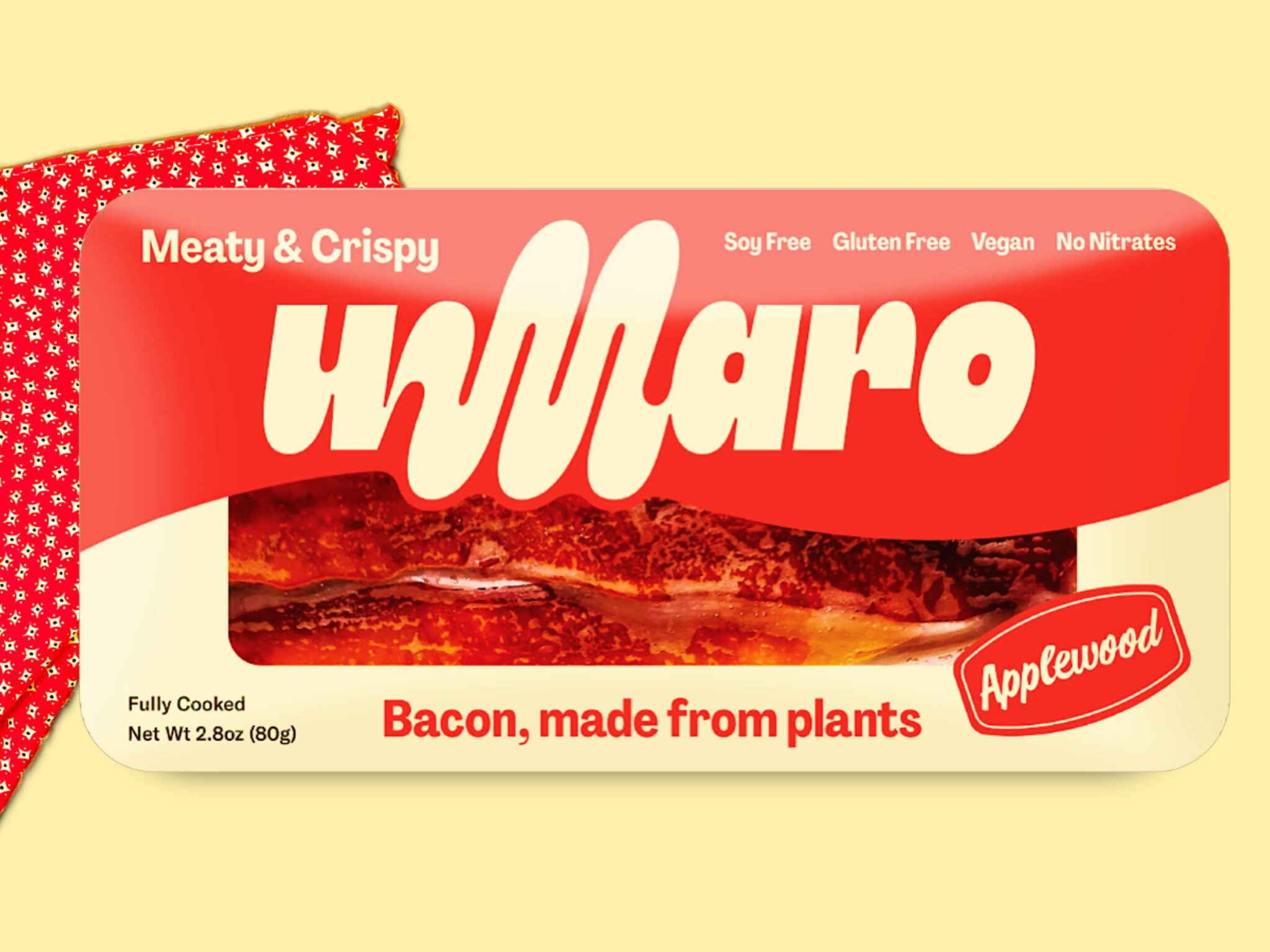Shark Tank Success Umaro Foods Raises $3.8M to Launch Seaweed Bacon in Supermarkets
5 Mins Read
Californian plant-based meat producer Umaro Foods has secured $3.8M in a seed funding round to help it reduce production costs and launch its seaweed bacon into retail.
The financing round was led by existing investor AgFunder, with support from Alexandria Ventures Investments, Climate Capital Bio, Ponderosa Ventures, and NBA all-star Chris Paul. It brings total investment in the vegan bacon producer to $6.8M, following a $3M round in 2022 (also led by AgFunder).
The latest capital injection will help Umaro Foods amp up production and bring down the costs of its seaweed-based bacon, and facilitate its move into grocery stores.
“People love our bacon because it nails the crispy, fatty texture of pork bacon,” Umaro Foods co-founder and CEO Beth Zotter told AgFunderNews. “Our innovative, seaweed-based formula is what differentiates our product from other brands and is now patented in the US.”
Leveraging the ‘most scalable protein bioreactor’

Zotter founded Umaro Foods in 2019 (then known as Trophic) with chief technology officer Amanda Stiles as the “first and only company” extracting protein from ocean-farmed seaweeds. The startup shot to fame in 2022 after securing a $1M investment for 7% equity from Mark Cuban on Shark Tank.
Umaro Bacon is already available at 250 restaurants and delis across the US, including Crossroads Kitchen, Plantega, Roam Burger and Choice Market. It’s in talks with universities to move its bacon into the catering sector as well. But now, it is casting a much wider net. “After achieving incredible traction in restaurants across the country, with sales growing sixfold in one year, we’re looking forward to reaching new customers,” said Zotter.
Armed with the new financing, Umaro Foods will soon launch onto supermarket shelves, starting with a leading retailer on the west coast. The CPG products include bacon strips and bits, as well as a bacon, egg and cheese breakfast sandwich.
The vegan bacon uses red nori seaweed as its key ingredient, which is supplemented with chickpeas, sunflower and coconut oil, agar and carrageenan, plus natural flavouring and colouring elements. “One reason bacon is so delicious is because it’s got a lot of fat [20g per serving],” said Zotter. “We’ve discovered a really innovative way to use the hydrocolloids in seaweed to hold on to high amounts of plant-based fat… That allows us to deliver that sensory experience that you get with bacon, which is what makes it so craveable.”
Umaro Foods has patent-pending extraction processes for two types of seaweed: red and brown. The former shares similarities with conventional pea and soy processing, and forms the base of its current bacon product due to its red hue, high protein content, and ease of import (the startup works with a co-manufacturer in Canada to extract protein from seaweed imported from South Korea).
But the red seaweed doesn’t have “those high-value hydrocolloids”, Zotter explained: “So our goal is to process both red and brown seaweeds, where we can get the protein out but also produce valuable side streams such as alginate, agar, and carrageenan, for which there are already established markets.”
The idea is, at scale, Umaro Foods’ protein separation process will produce hydrocolloids as well. “The ocean is the world’s most scalable protein bioreactor,” the CEO added. “It covers 71% of the Earth’s surface and contains over 80% of the world’s chemically reactive nitrogen, so it’s sort of a no-brainer that that’s where we should be getting the bulk of our protein.”
Sea-ing out the competition

The vegan bacon startup will additionally use the funds to move from a batch production process to a continuous one. “One of the things that makes meat alternatives very expensive is that they use techniques such as extrusion or fermentation that require large capital investments,” Zotter said.
But its high-throughput, low-capex manufacturing process will enable it to produce vegan bacon at half the cost of conventional options from the likes of Hormel and Smithfield. Currently, Umaro Foods is producing the equivalent of 60,000 lbs of product every year, but once sales grow enough to allow its machine to operate at full capacity, it can make over a million pounds of vegan bacon annually, with a potential revenue of $20M.
“It costs about half a million dollars to finance, so the payback time should be rapid,” said Zotter. “Our main goal in this next phase is to get to profitability. And this automated manufacturing process is going to be a key part of this.”
She further outlined the company’s plan to streamline its sourcing so it can move closer to the raw material in Asia: “We’re looking for partners to scale that process, either via a joint venture or a manufacturing partnership. And that would be most likely with a large food processing company with a base in Asia.”
Zotter added that Umaro Foods is open to developing a B2B arm for its seaweed protein, and is in conversations with other companies. But she reiterated that the current focus is to use it for its own bacon products. (The startup has previously suggested that it will look to develop pepperoni, salami and other cured meats from the seaweed too.)
The company has also been working on a project with a specialist firm to selectively extract rare earth elements and platinum group metals from seaweeds, which is backed by a $2M grant from the US Department of Energy. “The DoE is looking at seaweed as a source of critical minerals, so they’re funding us to develop a way to integrate a minerals extraction process into our protein separation process,” Zotter noted.
The seaweed protein sector is still in its infancy, and startups innovating with such ingredients have had a tough going – France’s Update Foods (which made algae milk) ceased operations in 2022, while seaweed-based seafood producer New Wave Foods was forced to shut just a few months ago. However, Umaro Foods has ridden the wave successfully.
“Umaro’s results showcase its adaptability, innovation, and success in introducing new products to a competitive market, spanning both foodservice and retail,” said Sofia Ramírez Calvo, venture partner, AgFunder.
The true test, however, will be its performance in the crowded vegan bacon market – in the US. MyForest Foods, Prime Roots, Thrilling Foods, Upton’s Naturals, Tofurky, Lightlife and Meat the Mushroom (another Shark Tank success) are just a few companies innovating in this space, which estimates suggest is worth $1.3B.
But given the inroads it has already made, Umaro Foods’s seaweed bacon could soon be swimming in success.




